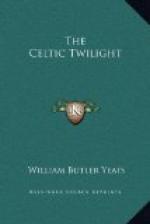scales, but their dress I cannot remember, for I was
quite absorbed in that gleaming woman. I asked
her to tell the seer whether these caves were the
greatest faery haunts in the neighbourhood. Her
lips moved, but the answer was inaudible. I bade
the seer lay her hand upon the breast of the queen,
and after that she heard every word quite distinctly.
No, this was not the greatest faery haunt, for there
was a greater one a little further ahead. I then
asked her whether it was true that she and her people
carried away mortals, and if so, whether they put
another soul in the place of the one they had taken?
“We change the bodies,” was her answer.
“Are any of you ever born into mortal life?”
“Yes.” “Do I know any who were
among your people before birth?” “You
do.” “Who are they?” “It
would not be lawful for you to know.” I
then asked whether she and her people were not “dramatizations
of our moods”? “She does not understand,”
said my friend, “but says that her people are
much like human beings, and do most of the things
human beings do.” I asked her other questions,
as to her nature, and her purpose in the universe,
but only seemed to puzzle her. At last she appeared
to lose patience, for she wrote this message for me
upon the sands—the sands of vision, not
the grating sands under our feet—“Be
careful, and do not seek to know too much about us.”
Seeing that I had offended her, I thanked her for what
she had shown and told, and let her depart again into
her cave. In a little while the young girl awoke
out of her trance, and felt again the cold wind of
the world, and began to shiver.
I tell these things as accurately as I can, and with
no theories to blur the history. Theories are
poor things at the best, and the bulk of mine have
perished long ago. I love better than any theory
the sound of the Gate of Ivory, turning upon its hinges,
and hold that he alone who has passed the rose-strewn
threshold can catch the far glimmer of the Gate of
Horn. It were perhaps well for us all if we would
but raise the cry Lilly the astrologer raised in Windsor
Forest, “Regina, Regina Pigmeorum, Veni,”
and remember with him, that God visiteth His children
in dreams. Tall, glimmering queen, come near,
and let me see again the shadowy blossom of thy dim
hair.
“And fair, fierce women”
One day a woman that I know came face to face with
heroic beauty, that highest beauty which Blake says
changes least from youth to age, a beauty which has
been fading out of the arts, since that decadence we
call progress, set voluptuous beauty in its place.
She was standing at the window, looking over to Knocknarea
where Queen Maive is thought to be buried, when she
saw, as she has told me, “the finest woman you
ever saw travelling right across from the mountain
and straight to her.” The woman had a sword
by her side and a dagger lifted up in her hand, and
was dressed in white, with bare arms and feet.
She looked “very strong, but not wicked,”




